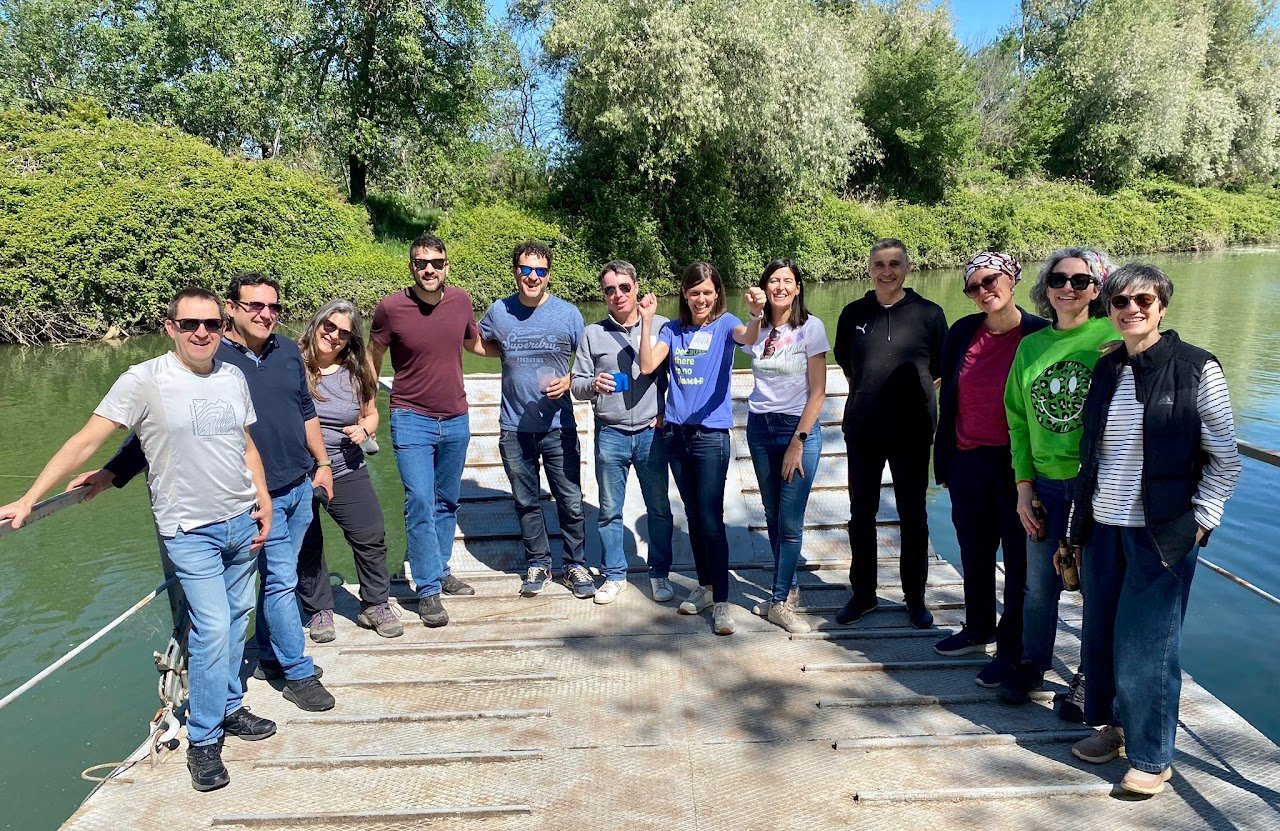MANIFEST

MANIFEST
The MÁS PLANETA association was created to promote reflection and social participation on socio-political aspects related to the ecological transition, the deepening of democracy, and achieving a Navarre with fewer social inequalities, besides promoting intercultural coexistence in Navarre.
There is scientific consensus on the severe ecological footprint that human activity generates. For decades, we have been exceeding the limits that maintain the planet’s natural balance.
Of the various ecological crises, the main one is the climate crisis. Human civilisation has developed over the last 11,000 years in an environment with a stable climate. This era, the Holocene, made it possible to develop agriculture, establish populations, and evolve. But human activity in recent centuries has forced us into a new era, the Anthropocene, in which we are the main source of disruptive changes on the planet. Each particle of CO2 accumulates in the atmosphere for a century. Studies indicate that the planet is capable of absorbing between 11 and 12 billion tonnes per year. However, this capacity was greatly exceeded in the 1960s.

The longer it takes to return to sustainable greenhouse gas emissions, the later, and worse humanity will emerge from this massive crisis. So far, no Homo sapiens has experienced such a concentration of CO2 that we are moving into a new scenario as species.
In addition to this broken balance, there are others with different levels of risk, clearly interconnected with each other, for example:
Loss of biodiversity and land use changes driven by livestock and agriculture, which implies deforestation and loss of ecosystems.
Excessive use of phosphorus and nitrogen for agricultural fertilisers leads to the disruption of balance in marine ecosystems. Overexploitation and pollution of the planet’s scarce freshwater (2.5%).
The acidification of the oceans is caused by global warming and excess CO2.
The current lack of knowledge of the consequences of the impact of both chemical pollution and artificial «new entities» (microplastics, radioactive elements, etc.).
Just minimalising stratospheric ozone is the only risk humans have been able to address by banning chlorofluorocarbons (CFCs). This is an example of global action that has allowed stratospheric ozone to recover.
For all these reasons, one of the main lines of action and reflection of this association will be to promote and influence the achievement of ecologically ambitious majority policies to achieve a fair and equitable ecological transition.
The data indicate a precise increase in social awareness of the ecological crisis in Spain. However, the transformation of this growing concern into clearly more sustainable policies, or the establishment of currents located in political environmentalism, is very complex.
At the same time, we observe how collecting data and negative news about ecological crises provides fertile ground for the generation of eco-anxiety, pessimism, catastrophism, social frustration, etc. These can lead, in some cases and discourses, to social resentment among the most sensitive sectors.
We understand the basis of these discourses, but we are committed to other methodologies for working on social subjectivities. We focus on eco-social education and to build and establish a new common sense of citizenship sensitised to the issue. We believe that, although the scientific evidence is clear and certainly negative, social action has the potential to improve or slow down the worsening of present and future situations. We firmly believe that we cannot afford to fall into «There is no future» discourses; a kind of reminder of the punk movement of the 1980s. It is one thing to address the most activist sectors, it is another to address the broad majorities.
Excessive catastrophism can have the opposite effect, demobilising and scaring people away. We also detect a worrying anti-environmentalist populism, reactionary to the necessary demands for ecological transformation and to the enormous public investment that this pending green revolution implies.
We are committed to setting realistic but ambitious political and societal goals for green transformation and energy transition. We need to develop policy frameworks that might succeed and be aware of the broad social and economic alliances needed to get the job done.
We need to generate hope that socio-political action is useful. This will require an active citizenry that pushes public administrations to be more entrepreneurial and proactive but it will also require a private sector (both the social economy, SMEs, and large companies) oriented towards transforming the current economic system into something as sustainable as possible.
On another level of reflection, we believe it is necessary to differentiate between short-term and long-term horizons to face the current climate emergency.
In the short-term, there is an urgent need to significantly reduce greenhouse gas emissions, which means moving from fossil fuel capitalism to the most sustainable capitalism possible, based on two keys: First, to promote energy saving as a priority (if the whole planet consumes like the first world, there is no way out), clearly transforming the current transport culture (the core source of emissions). Secondly, to reach the total electrification of our societies with electrification powered by non-fossil fuels. This necessarily implies implementing renewable energy generation. The challenge is how to speed up this process, bearing in mind the need to establish safeguards against unequal territorial impact (saturated zones) and the environmental impact that some of the installations have on fauna and landscape.
In the long term, we must necessarily succeed in establishing a radically more sustainable alternative to the economic systems that have prevailed in the last two centuries on the planet (capitalist systems and communist systems). But in the debate on how best to deal with the current ecological crisis, we cannot wait for these entrenched systems to change suddenly. In other words, we support the search for a new post-capitalist planetary horizon, which allows us to explore ways to reinvent a more sustainable and just collective life. But we assume it is up to us to live and manage the «meanwhile».
Our postulates are born from a proposal in which the only possible radicalism is democratic. However, we want to give importance to the defence of democracy. We wish to develop a new socio-political concept, that of SUSTAINABLE DEMOCRACY. In it, we not only contemplate the social aspects to correct the prevailing economic model, seeking to make it as humane as possible, but we seek to incorporate the environmental variable, which connects with four more dimensions to give voice and take into account the rights of different collectives and realities. These dimensions are:
Interpersonal dimension: taking into account the reality and rights of each person, from the defence and commitment to and with human rights and to a healthy and respectful life with the place in which we live.
Inter-territorial dimension: Bearing in mind that the defence of our rights cannot ignore the realities of other areas and other territories, taking into account the rights of the people who live there and that they can continue to live there in a dignified and sustainable way. Also, defending the values of the territory itself through the conservation and care of the environmental quality of those places.
Intergenerational dimension: Defending and considering the rights of people who currently do not have a voice because they are not present, either because they were not born or because they have left us. We are committed to preserving and making sustainable practices and rights that our ancestors worked so hard to achieve and have made us a better society, but which ensures that future generations can sustainably enjoy them.
Inter-specific dimension: defending the rights of other forms of life and systems that are necessary for the proper health of the planet and that by their very nature cannot actively defend them within our democratic dynamics.
We are committed to a model of modern democratic functioning, a model of plural and operative citizen participation, which knows how to integrate scientific and technological knowledge to make it more effective, which is committed to values of improving the common good and the planet, and which allows the participation of the four dimensions.
The climate crisis knows no borders. It affects the whole planet equally, but certainly, the capacity of countries to adapt to the disruptive changes to come is uneven. This is why ecological transformation has to go hand in hand with climate justice and social justice. Helping the most vulnerable populations to make this transformation possible.
From this association, we show our interest in public policies aimed at reducing social inequalities and protecting the most vulnerable sectors of society. We believe in the effectiveness of redistributive policies and the fight against poverty. We are concerned about strengthing public health policies in their triple dimension (physical, social, and mental).
Other pro-equality approaches lead us to continue supporting policies aiming to guarantee equality between men and women and equality between people of different sexual orientations. Feminism and environmentalism will continue to be the axes of transformation in all societies of the planet in the 21st century.
In terms of the public services that make up the pillars of the Welfare State that we can enjoy in this part of Europe, we are committed to dignifying health policies, especially at the mental health level.
We are also committed to reducing the territorial inequality that exists between urban areas and rural environments, which are the ones that support the care of the territory and lack the proximity to the services available to greater and more populated localities. It is essential to take into account and give value to the environmental services these localities support and, in many cases, maintain so that they perceive them as an asset and an alternative way of life instead of a limitation that prevents them from having standards of quality of life such as those found in urban areas.
We consider it fundamental to recover and re-dignify the concept of sustainability as a principle that is already socially implanted and integrated as an essential value in political and social discourse. The perversion of this concept by economic elites by neoliberal sectors or by mere marketing techniques based on greenwashing does not make it a negligible concept. The eco-social movements are responsible for ensuring that it is used properly and is not perverted.
Sustainability as a universal value, like others such as justice or equality, is a principle to strive for. There are no egalitarian or fair societies. There are fairer or more egalitarian ones. In the same way, there are societies’ models and actions that are more or less sustainable, and we want to focus on those that allow us to face a future in which human development and the planet’s health are compatible. We are committed to sustainability as a value in which to evolve and deepen to move towards increasingly strong levels of sustainability.
In this sense, it is essential to reflect on the model of one of the pillars of this concept: the economy. This is a fundamental factor, and we cannot run away from it as it is currently polluted by capitalist neoliberalism. This variable is the key to any human model. We must not forget that the concept of «ECONOMY» derives from the Greek words Ekos Gnomos, the management of the house (the planet being the house of life). This management is fundamental so that future planetary models of participation of the human species within the biosphere are compatible with a healthy ecological balance for all the species that inhabit it.
We intend to act in Navarre. A diverse and complex society in terms of identity and culture. We are only 1.4% of the Spanish population and 0.15% of the population of the entire European Union. But in these 664,000 people, several identity dynamics are mixed.
Firstly, the autochthonous dynamic. Navarre’s identity is transversal, a clear fact. Based on this, different nuances and combinations can be observed: from the majority Navarrese-Spanish point to the Basque-Navarrese to the Basque-Navarrese-Spanish fact.
Secondly, the most exogenous dynamic is the undeniable crossbreeding of today’s contemporary societies. Some 11.1% of the population of Navarre is officially foreign (some 73,000 people), but part of the foreign-born population already has Spanish nationality (some 35,000 more people).
This reality will be a constant. It is undeniable and inevitable and logically has positive aspects: curbing depopulation and aging, economic growth, diversity and cultural wealth, planet human rights of mobility, etc. And, more complex points to manage in specific cases: greater investment in welcoming and integrating, situations of severe poverty to manage, cultural clashes in different aspects (different or non-existent democratic culture, different role of religions in personal life, different levels of assumption of equality between men and women, etc.).
For all these reasons, at MÁS PLANETA we are committed to promoting these values of an intercultural and mixed-race society in Navarre. Trying to do our bit to stop discourses that generate hatred, xenophobia, racism, religious fundamentalism, anti-pluralist identity fundamentalism, and the addresses creating political violence.
Navarre. June, 2023.
